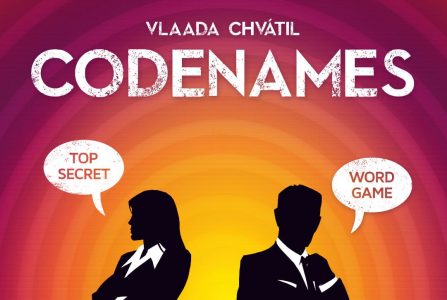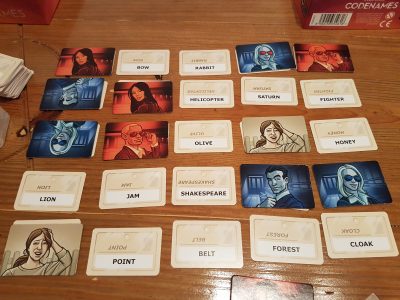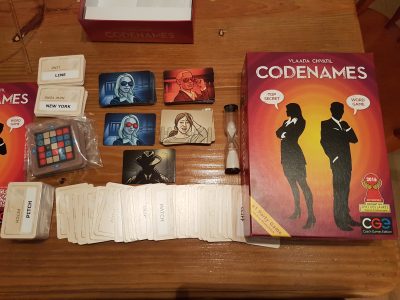Codenames is based around the unusual concept of frustration equals fun. This team based word association game for 4 – 8 players, where games rarely lasting longer than 20 minutes, is a great example of a party game. What links cloak, spell and train? The Harry Potter franchise potentially but how can you convey that to your team with only one word and one number? These are the sort of mental conundrums that will spin around your head in Codenames. The only issue, even when you have that brilliant clue your teammates still need to guess what you mean.
So how exactly do you play Codenames? Players split into two teams, with each nominating a leader. From the hundreds of possible words in the box a 5×5 grid is created. The team leaders look at a randomly selected Key card which determines the Codenames of their operatives. Both teams strive to contacted all of their operatives first, by guessing their leaders clues, in order to win.
After setting up the first game I thought there was a decent number of cards in the Codenames deck. It was only after the game had finished that I realised that the cards were double sided. There must be thousands of variations of the 5×5 grid you have to lay, extending the variety of the linking words used. The game could have gotten a bit stale if the same “Animal 3” style clues were used every game, thankfully this is avoided by the huge card pool.
Included in the box is a sand timer and although it was used in the majority of my games I only found it impacted the game once. Realistically if your game is lasting too long you’re taking the board game to seriously. Codenames is at the end of the day a light-hearted party game which is perfect for players of all ages.
Codenames will test the very bonds of your friendships, in the same way games such as Pictionary have in the past. You’ll come up with what you determine to be the worlds best link between words and leave your teammates stumped; merely guessing at what you mean. The premise of Codenames revolves around being on the same wavelength as others. Often even when the game has finished the entertainment carries on. Mostly thanks to the look on players faces after the reveal of what ‘that’ clue, which confused the team, was meant to mean.
Because of this, it is great for couple nights, as much as with groups of friends. Seeing if partners or family members think the same can be extremely enlightening, but it can definitely see the odd competitive base argument erupt too. While the game can be extremely family friendly some rude or dark suggestions, with the right group of people, inevitably seep in. It all depends on the group you play it with and how reserved the players are.
So one team is behind, with their opposition managing to guess their leaders clues. Not all is lost though. There is always a chance of a comeback and also a rather a heavy handed instant lose mechanic called the Assassin. While it isn’t easy you always have the opportunity to make elaborate, outside of the box, vaguely links. These could massively pay off and get you back in the game and if they don’t they normally result in you laughing at your team leaders incompetence. Technically, you could even play a luck based guessing game, playing the odds, but this rarely works out well.
The Assassin is a great instant win comeback mechanic that adds tension to the game. It gives the losing team a chance at victory without getting a single clue right. It also adds an extra layer of uncertainty into players choice. There is nothing stopping team leaders going for 1 word at a time but this game is won by those vague links for 2 or 3 words at a time. It’s when these weak links are voiced that the assassin really factors in. You don’t just have the ability to guess incorrectly, not even the ability to just accidentally pick one of the opposing team’s Codenames, you could literally lose the game with an incorrect guess! The game almost feels like an extreme team based version of the classic videogame Minesweeper at times.
No-one likes those whom cheat when playing board games but I did witness, and they fully admitted to it, accidental cheating. Because both the team leaders and the “guessers” are looking at the same set of cards it is sometimes possible to see where the team leaders are look; when trying to think of words and links that they could make. It is this watching of eyes that gives the possibility of cheating and in the aforementioned time how it was possible for someone to accidentally see which cards their team leader was looking at. Giving the team leaders a minute to look over all the words at the beginning of the game seemed to mitigate this and really doesn’t slow the game down at all.
Codenames certainly has been an instant hit with the people I’ve played it with. It manages to be this instant success as it is instantly fun. The game has an extremely short set up time meaning its on the table in no time at all and the length of the games is short too. Yet Codenames can still provide hours of entertainment. It combines sometimes funny, sometimes rather strange links with rather tense gameplay where either team could win with the next correct answer or throw away their lead by selecting the assassin. Bring Codenames out at any gathering and I’m sure it’ll go down well and next time they’ll be asking to play!
[Editor’s Note: Codenames was provided to us by Esdevium Games for review purposes.]




